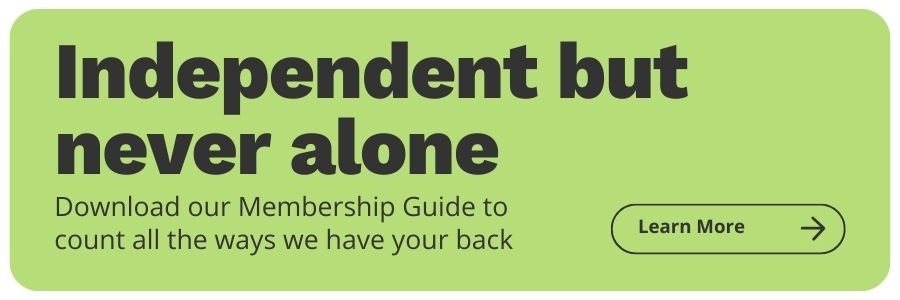The Best of What Would Arlene Say: Advice for Independent Financial Advisors
Share this
Since coming on board as XYPN's "head cheerleader", Executive Business Coach Arlene Moss has given independent financial advisors a lot of advice. That is, after all, quite literally her job. Whether you're struggling with impostor syndrome or you're having trouble holding yourself accountable for your firm goals, Arlene is always right there with an answer.
She has even authored nearly 70 advice-centric blogs on topics including time management, team building, referrals, and client relationships (and so much more!) over the past two and a half years. That's why we've dedicated an entire post to showcasing Arlene's top 10 most popular blogs of all time. Get ready for advice so good, you can't put a price on it (but lucky for you, it's free).
#1. Using Personality Tests to Create Stronger Teams: What Would Arlene Say?
Personality tests are designed to help you understand yourself, create a cohesive team environment, and grow both personally and professionally. Many small businesses use personality tests in some capacity, and I’m always impressed by the results. Financial planners, in particular, can benefit from personality tests.
As a solo practitioner, different test results can help you hone your client-facing skills and understand your best work patterns or where you might be able to outsource work to someone who is better suited to the task. If you’re running a larger financial planning practice, personality tests can help you manage your team, make hiring decisions, and so much more.
#2. How to Find Your Niche as an Independent Financial Advisor: What Would Arlene Say?
The market of available clients for financial planners in America is massive. It’s impossible to serve every prospective client, and moreover to serve them all well. Every unique niche has its own unique set of financial pain points and needs. When you choose to serve one niche, you’re able to accomplish a few things:
You focus your efforts. This is true for marketing, social media, advertising, continuing education, operations, technology , you name it. A niche helps you focus your efforts and overall business strategy This makes it easier on you as a planner to scale comfortably and do more of the work you love.
You offer higher value to clients. Have you ever heard the saying, “An inch wide, but a mile deep?” A niche practice helps you zone in on what your clients need and improve your knowledge base in those specific areas. You’re able to truly level up your service offering because you’re so focused on one specific area of financial planning. The value you can provide your small niche group of clients skyrockets!
#3. Reducing the Lifestyle Practice Stigma: What Would Arlene Say?
As an XY Planning Network coach, I love all financial planners equally. I love rooting for everyone and seeing you all grow into yourselves as business owners and individuals. But if there’s one thing that drives me crazy about this industry, it’s the lack of respect that exists for people working to build a lifestyle practice.
There’s often a stigma around running a lifestyle-oriented financial planning practice. I’ve heard several negative things about this idea, including:
Lifestyle practice owners aren’t running a “real” business.
A lifestyle practice is a great option for people who don’t want to hustle.
Building a business takes a lot of time and effort, and if you’re not willing to give it everything, then you won’t be successful.
#4. How Financial Advisors Can Master Referrals: What Would Arlene Say?
There is real value in building your network and learning to ask for referrals in a direct and efficient way. When you’re able to clearly ask people to refer you the types of clients you want to work with, and you continue to build excellent relationships with the people in your referral network, you set yourself up to find success on several levels:
- You’re getting clear on who your ideal client is, which helps you to hone your message, improve your marketing, and your practice as a whole!
- You’re figuring out how to vocalize who your ideal client is so that, when people ask, you can communicate it.
- You’re building a network. A network of colleagues can help you to refer non-ideal clients out to advisors you trust. A network of COIs can help you to serve your clients when they need to talk to an attorney, CPA, or other professional. Long story short, asking for (and giving!) referrals is a fantastic way to create lifelong connections that benefit your business and your clients.
#5. 7 Things to Do Before You Launch Your Financial Planning Firm: What Would Arlene Say?
I talk to a lot of advisors who are gearing up to launch their firms. The world can never have enough fee-for-service financial planners, and I guarantee there are a fantastic group of clients out there just waiting for your unique planning style, personality, and experiences.
Unfortunately, not all financial planners feel prepared to strike out on their own.
Launching your own firm is exciting, but it can also be incredibly stressful. Putting some legwork in ahead of your launch can help prevent a lot of headaches once you get started.
You want to make sure you’re completely ready to hit the ground running, or at least as ready as anyone can be when they launch their own business.
These seven steps can help you start to lay the groundwork to successfully launch your own fee-for-service financial planning firm.
#6. Prospective Clients and that Initial Client Meeting: What Would Arlene Say?
If you’re an advisor, this experience may sound familiar: You’re speaking with a prospective client and as they’re leaving the initial meeting you realize something – you have no idea if you’ve met their needs and expectations. Or maybe you feel confident coming out of a 2-hour (or longer) initial meeting with a prospect only to find out later they went with somebody whose services are way different than yours. I’m sure you’ve got your pitch down, and you’re obviously a people person (or else you wouldn’t be in the financial planning business in the first place, right?). So, what gives?
#7. A Case for Jumping in Full Time When Starting Your RIA: What Would Arlene Say?
A colleague of mine recently told me that as she speaks with new planners, there seems to be a growing trend: They think it’s in their best interest to continue working full-time while they slowly launch their financial planning practice.
I understand the draw of this idea. In today’s world, it seems possible to “side hustle” pretty much anything—even your future full-time business and career. Plus, working full time might give you the income you need to continue supporting yourself and your family while your business launches.
In theory, this idea works. However, “in theory” almost never holds up in the real world. As someone who has coached financial planners for years, I’ve seen this idea flop time and time again.
#8. Scheduling Your Business: How to Get Organized, Stay on Track, and Hit Goals - What Would Arlene Say?
When it comes time to start your workday, do you start with a to do list? Maybe you have a planner or an online calendar that keeps everything color coded and organized. Regardless of the planning method you subscribe to – do you feel like you usually get everything done? If your answer was, “Yes!” good for you! You’re one of maybe five people I know who always feel fully accomplished at the end of their workday! I joke, but in all seriousness, even you probably feel like you’ve got some big-picture goals that you’re not making progress on.
#9. How Financial Advisors Can Overcome Their Self-Doubt: What Would Arlene Say?
I’ve been on a lot of calls lately with planners who dismiss their own knowledge and doubt the value they offer. This is a common trend among entrepreneurs (or business professionals in general, for that matter).
It’s easy to slide into a narrative where you’re telling yourself your experiences aren’t enough to validate your success (Impostor Syndrome, anyone?).
If you're feeling like this, you are not alone. This type of self-doubt runs rampant. Knowing your worth (and charging appropriately for it), choosing a niche (and believing in it), and acknowledging your financial planning education (and owning it) should all be givens. And yet they’re not.
#10. What Is The Key To Cross-Generational Communication? What Would Arlene Say?
Generational differences impact everything from our personal relationships, business marketing to client service. Are you a Baby Boomer, a Gen Xer or a Millennial? Do you get tired of labels and not really care? How do you characterize these groups? Understanding where we, and all those around us, fit in is an often overlooked ingredient for success. A lack of awareness can lead to frustration and stymie your communication. How an individual views technology is an integral part of effectively conveying your message. Knowing the mindset of those with whom you communicate will improve your message delivery and help them better connect with you.
Share this
- Fee-only advisor (381)
- Advice (305)
- Business Development (248)
- Independent Financial Advisor (203)
- Growing Your Firm (161)
- Marketing (133)
- Financial Planning (129)
- What Would Arlene Say (WWAS) (81)
- Business Coach (80)
- Firm Ownership (78)
- Training (75)
- Compliance (72)
- Business (69)
- Building Your Firm (65)
- Financial Advisors (63)
- Online Marketing (61)
- Events (59)
- Starting a Firm (52)
- Staffing & HR (49)
- Technology (49)
- From XYPN Members (48)
- Launching a firm (46)
- Advisors (41)
- Entrepreneurship (38)
- Taxes (37)
- Networking & Community (33)
- Interviews and Case Studies (32)
- Investment Management (31)
- Sales (27)
- Social Responsibility (27)
- Tax Preparation (27)
- XYPN Invest (26)
- Business Owner (25)
- Small Business Owner (20)
- Financial Management & Investment (19)
- Industry Trends & Insights (19)
- Financial Education (17)
- Financial Planners (17)
- Independent Financial Planner (17)
- Tech Stack (17)
- XYPN (17)
- Leadership & Vision (16)
- Investing (15)
- Niche (15)
- How to be a Financial Advisor (14)
- NextGen (14)
- RIA (14)
- Media (13)
- Preparing to Launch (13)
- Press Mentions (13)
- RIA Operations (12)
- RIA Owner (12)
- XYPN Membership (12)
- Assets Under Management (AUM) (11)
- First Year (11)
- Goals (11)
- Scaling (10)
- Advisor Success (9)
- Building Your Firm (8)
- Communication (8)
- Lessons (8)
- Study Group (8)
- Time Management (8)
- Virtual Advisor (8)
- Behavioral Finance (7)
- Growth (7)
- Pricing Models (7)
- From Our Advisors (6)
- Independent RIA (6)
- Money Management (6)
- Motivation (6)
- Processes (6)
- Automation (5)
- Broker-Dealers (5)
- College Planning (5)
- Filing Status (5)
- How I Did It series (5)
- Investment Planner (5)
- Mental Health (5)
- Michael Kitces (5)
- Preparing to Launch (5)
- RIA Operations (5)
- Retirement (5)
- Risk and Investing (5)
- S Corpration (5)
- Support System (5)
- TAMP (5)
- Wealth (5)
- Year-End (5)
- Client Services (4)
- Outsourcing (4)
- Selling a Firm (4)
- Succession Plans (4)
- Benchmarking Study (3)
- Budgeting (3)
- Career Changers (3)
- Engagement (3)
- Fiduciary (3)
- Getting Leads (3)
- Membership (3)
- Millennials (3)
- Monthly Retainer Model (3)
- Partnership (3)
- Pricing (3)
- Recordkeeping (3)
- Risk Assessment (3)
- Small Business (3)
- Staying Relevant (3)
- Work Life Balance (3)
- Advice-Only Planning (2)
- Bookkeeping (2)
- Charitable Donations (2)
- Client Acquisition (2)
- Differentiation (2)
- Health Care (2)
- IRA (2)
- Inflation (2)
- Productivity (2)
- Implementing (1)
Subscribe by email
You May Also Like
These Related Stories

The Best of XYPN Radio: Advice for Independent Financial Advisors

XYPN Roundup: Our Most Popular XYPN Radio Episodes for Independent Financial Advisors





